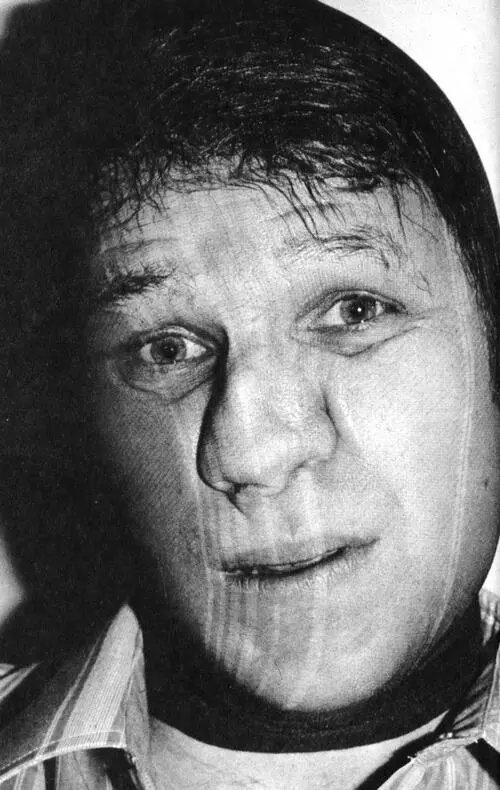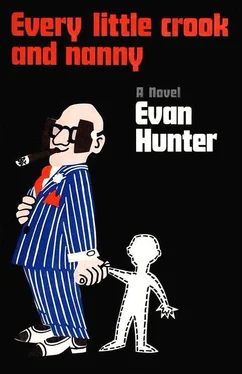
The headlines blinked alternately onto the screen of Luther’s memory, burning themselves out at once, melting into molten type, then sinking to his heart, lodging there like a steaming cannon ball. Many Maples, he thought, oh my God. Carmine Ganucci, he thought, oh my God.
“Oh my God!” he moaned aloud, and instantly hung up. He bounded from his chair, clasped both hands to his head, looked at the ceiling, and shouted, “Don’t either of you ever read the newspapers!”
“What is it?” Ida asked. “What’s the matter?”
“We’ve got to take him home at once,” Luther said. “My God, do you know whose son we’ve kidnaped?”
“Carmine Ganucci’s,” Lewis said.

Ganucci had set his watch with New York time the moment they left the ground at Heathrow. It was now 7:50 P.M., which meant that in little more than an hour they would touch down at Kennedy. He glanced over at Stella, who was asleep in the seat beside him, snoring lightly. Good, he thought. He liked it when Stella went to sleep. It gave him time to consider his arrangement.
Ganucci always thought of himself as a sort of Cary Grant, and of his arrangement as a sort of Grace Kelly. Not that she looked at all like Grace Kelly, although he did resemble Cary Grant a lot, especially around the eyes. (He wished he could talk like Cary Grant, but what can you do?) In his mind, the way they had met had been almost like a movie. He could almost see the diatribe unfolding, just as if the lines were written in a screenplay and they were speaking them while looking into each other’s eyes.
CARY: Excuse me for asking this, miss, but what is a nice girl like you doing in a place like this?
GRACE: What’s wrong with this place?
CARY: It’s a very nice place, but not for a girl like you.
GRACE: I think it’s a very nice place.
CARY: So do I. Don’t misunderstand me. You are the best lay I’ve had in this whole city. Maybe in the whole world.
GRACE: Then what are you complaining about?
CARY: Complaining? Who’s complaining? Do I look like I’m complaining? I’m a very satisfied customer.
GRACE: Don’t tell me, tell Madam Hortense.
CARY: I will, believe me. If you want me to. But I don’t see why you should worry about her opinion, a girl like you with talent like you got, and class besides.
GRACE: I work for Madam Hortense.
CARY: That’s exactly the point.
GRACE: I guess I’m missing the point.
CARY: I am thinking of a more permanent arrangement.
GRACE: This is a very permanent arrangement.
CARY: I was thinking you could leave here for an even more permanent arrangement.
GRACE: If I left here, Madam Hortense would break my head.
CARY: If you don’t leave here, maybe I will break Madam Hortense’s head, and yours besides.
GRACE: I never thought of it that way. What sort of an arrangement did you have in mind?
CARY: I had an arrangement in mind where you would leave here with me, and never come back. And where you wouldn’t have to do what Madam Hortense tells you to do all the time. Only what I tell you to do.
GRACE: I fail to see the difference.
CARY: The difference is I am Carmine Ganucci.
GRACE: Oh.
Carmine Ganucci was getting an erection. He rang for the stewardess, and when she arrived, he asked her if she had any Alka-Seltzer. The stewardess spoke with an English accent, which didn’t help at all. She asked him if he had a headache.
Benny Napkins was discovering that, unless a person is extremely sure-footed, a fire escape can be a difficult thing to negotiate even during the daytime; nighttime and darkness, not to mention intoxication, only compounded the difficulty. Nonaka did not help at all. Nonaka kept singing “Pretty Parasol and Fan” as they slowly staggered and stumbled their way up the narrow iron-runged ladders on the rear wall of the building. On the third floor, a lady poked her head out of a window, looked directly into Dominick the Guru’s face, and said, “Oh!” Dominick replied, “Softball team, lady,” grinned reassuringly, and continued up the ladder to the fourth floor. Behind him, Nonaka bowed to the lady, almost fell off the fire escape, regained his balance, and continued singing his little song. Benny kept wondering how many people in the city of New York fell off fire escapes as opposed to, say, bridges or tunnels.
Dominick was looking into yet another window.
“Recognize it?” Benny asked from below.
“Onward,” Dominick said. “Upward.”
“Who’s that?” a man in his undershirt asked.
“Gas company,” Dominick said.
“Is there a leak?”
“There’s a leak,” Dominick said.
“Good evening, sir,” Nonaka said to the man, bowing.
“Good evening,” the man answered, bewildered.
Nonaka went by singing.
“Where are your credentials?” the man asked Benny as he went past the window and started up the ladder to the next floor.
“In the car,” Benny said over his shoulder.
“Oh. Okay,” the man said, and pulled down his shade.
Snitch Delatore knew that fifty thousand dollars was a lot of money. Everybody knew that. Even Arthur Doppio knew that. Snitch further knew that maybe, just maybe, there might possibly be a slender chance that Arthur could actually talk Nanny into parting with that kind of money tonight. But Snitch also knew, by heart, a proverb his sainted grandmother had taught him at her knee, “Prendi i soldi e corri” — which loosely translated into English as “Take the money and run.” And whereas fifty thousand dollars was most assuredly the stuff on which dreams are made, there was a basic reality to twenty-five bucks in cold hard cash.
Everybody was in the money business, Snitch figured; it was merely a matter of how much a person was willing to settle for. His sainted grandmother would have settled for five dollars and a carton of name’s day pastry. Given the intervening years and the rising spiral of inflation, Snitch felt that twenty-five dollars was only fair and reasonable recompense for a secret already shared by everybody and his brother, including Benny Napkins. Which is why he went to see Lieutenant Bozzaris, who had promised him just that sum for fresh and original information.
“Help you?” one of Bozzaris’ fellows asked as Snitch stepped up to the gate in the slatted wood railing.
“I’d like to see the lieutenant,” Snitch said.
“What about?”
“I have some information for him,” Snitch said.
“Oh yeah, that’s right,” the detective said. “You’re the stoolie.”
Snitch made no reply. Sticks and stones could break his bones, but twenty-five bucks was twenty-five bucks. In silent dignity, he waited for the detective to check with Bozzaris. The door to the corner office opened at once, and Bozzaris himself stepped into the squadroom to greet him, hand extended.
“Well, well,” Bozzaris said, “what a nice surprise!” he turned to the detective and yelled, “Sam! Two cups of coffee on the double!”
“We are out of coffee, Skipper!” Sam yelled back.
“See what I mean?” Bozzaris said. “There’s never any coffee around here. What’s the information you have for me, Snitch?”
“It’s information about a major felony,” Snitch said, and the telephone in Bozzaris’ office began ringing.
On the tenth-floor fire escape, Dominick looked into yet another window, and said, “This is it.”
Читать дальше














